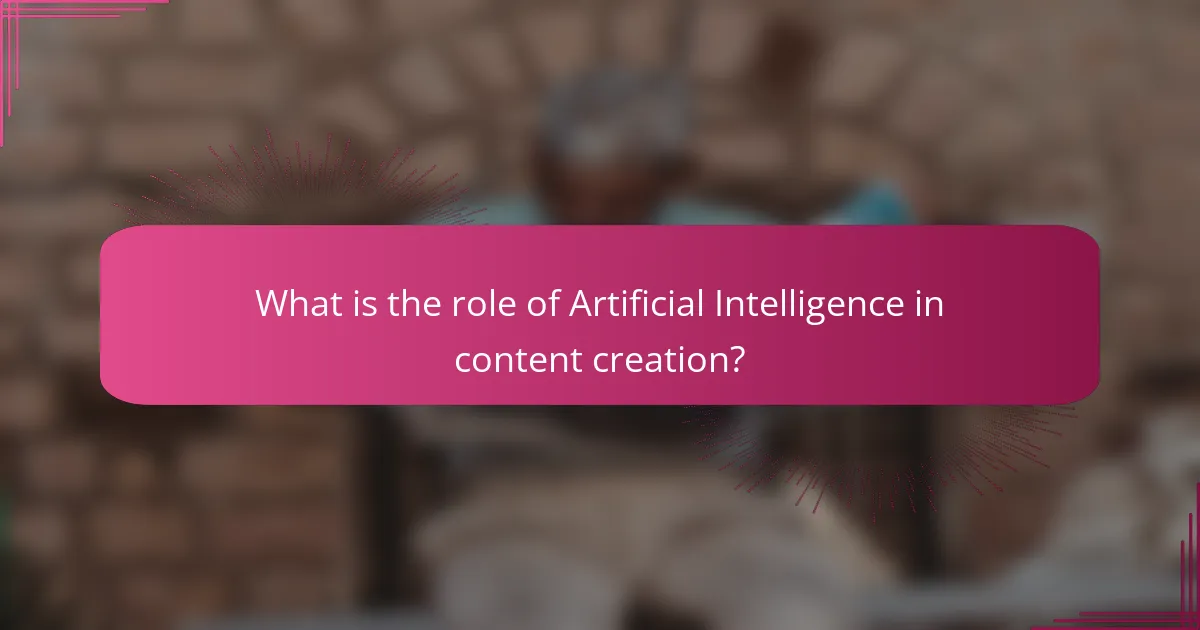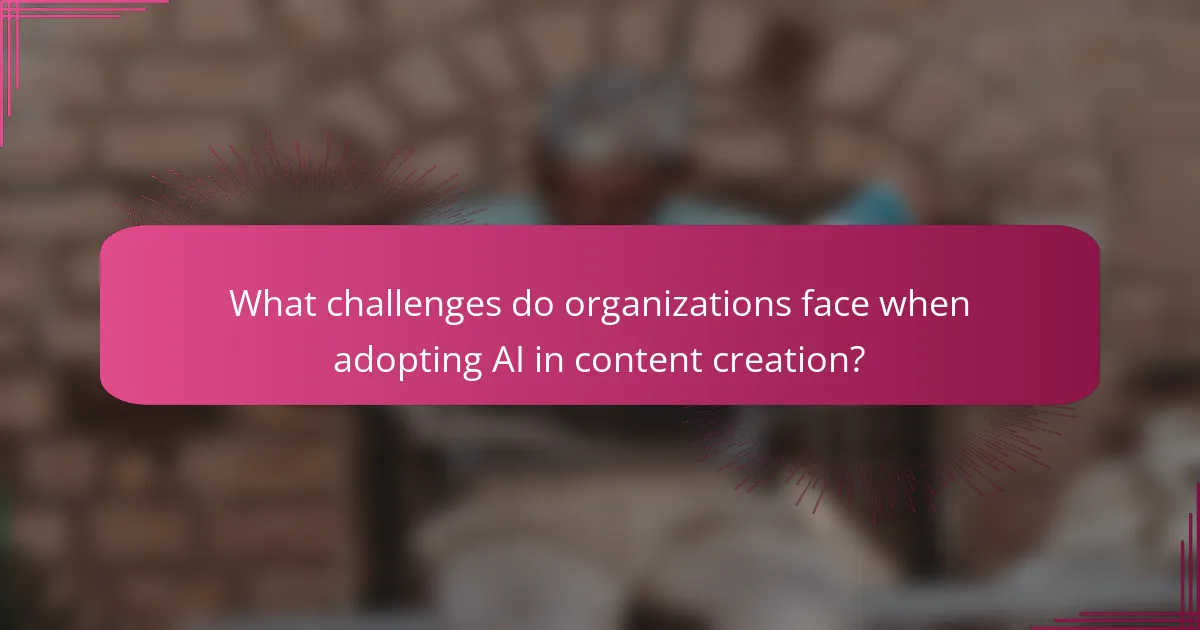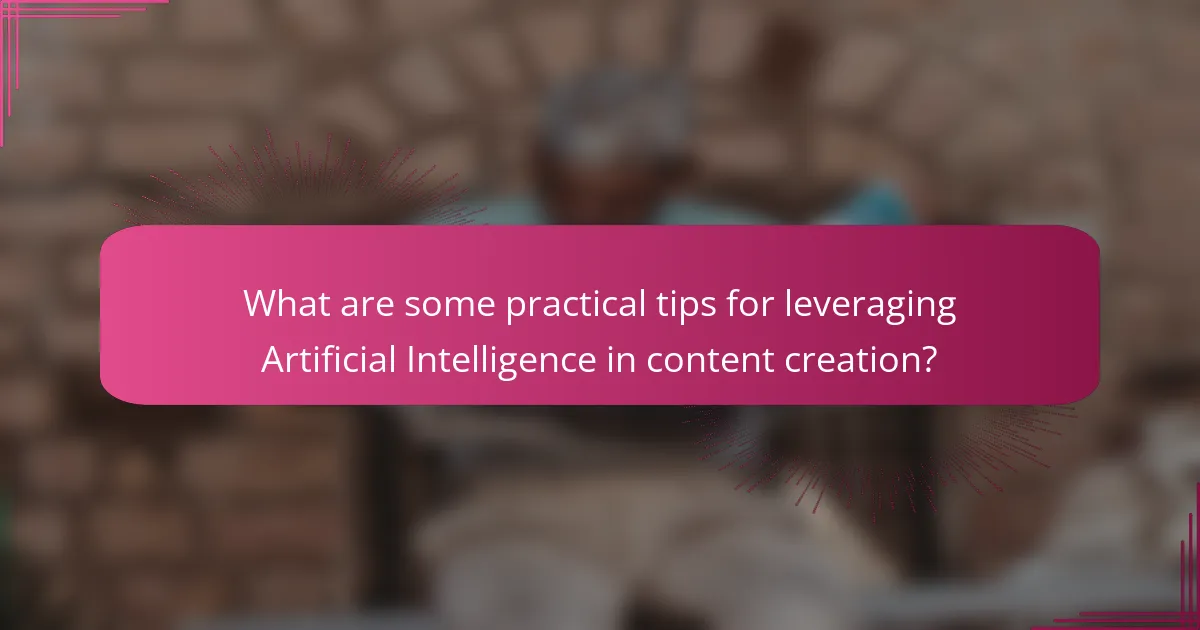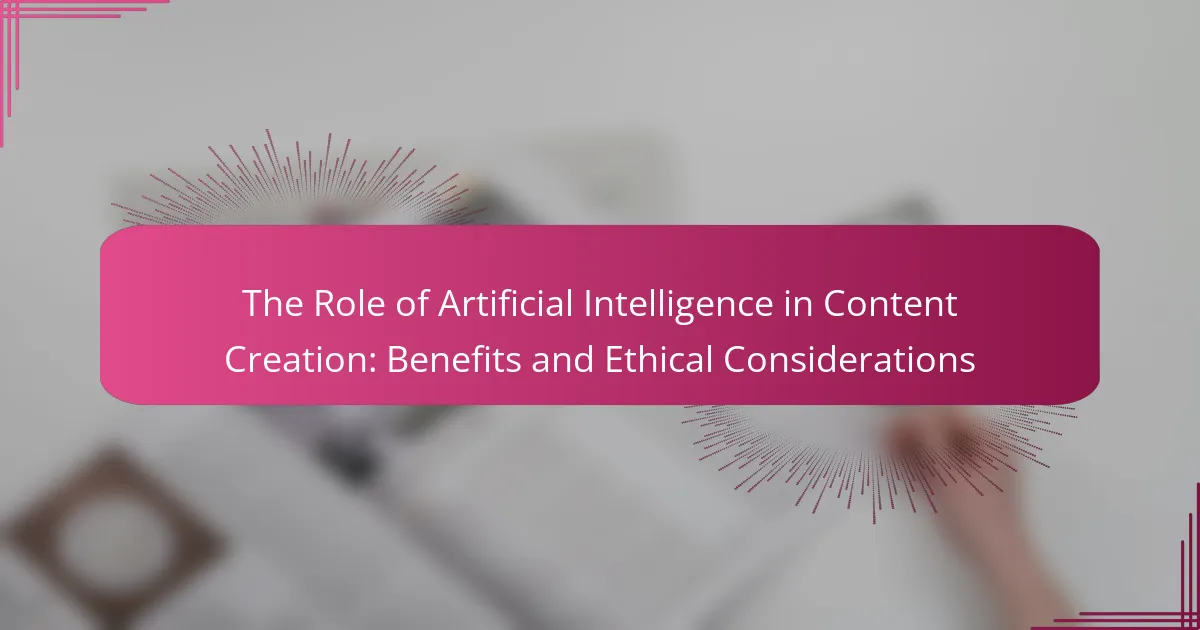Artificial Intelligence (AI) plays a crucial role in content creation by automating processes, enhancing efficiency, and boosting productivity. AI tools can generate various types of content, including text, images, and videos, while optimizing SEO to improve visibility. Despite the advantages, organizations face challenges such as data quality issues, a skills gap, and integration difficulties, which can hinder effective AI implementation. Additionally, ethical concerns related to AI-generated content, including copyright and bias, must be addressed. This article explores the benefits of AI in content generation and the ethical considerations that organizations must navigate for successful integration.

What is the role of Artificial Intelligence in content creation?
Artificial Intelligence (AI) significantly enhances content creation. It automates various processes, improving efficiency and productivity. AI tools can generate text, images, and videos quickly. They analyze data to tailor content to specific audiences. AI algorithms optimize SEO, increasing visibility. Machine learning enables continuous improvement based on user engagement. According to a 2021 report by McKinsey, AI can increase content output by up to 50%. These capabilities allow creators to focus on strategy and creativity.
How does Artificial Intelligence enhance the content creation process?
Artificial Intelligence enhances the content creation process by automating repetitive tasks. It streamlines research, allowing creators to gather information quickly. AI tools can generate ideas based on trending topics. They assist in drafting content, improving efficiency. Natural Language Processing enables AI to refine language and style. AI can analyze audience engagement data to optimize content. These capabilities lead to higher quality and more relevant content. According to a study by Content Marketing Institute, 70% of marketers believe AI improves content effectiveness.
What technologies underpin AI in content creation?
AI in content creation is underpinned by several key technologies. Natural Language Processing (NLP) enables machines to understand and generate human language. Machine Learning algorithms analyze data patterns for content generation. Deep Learning techniques enhance the understanding of context and semantics in text. Neural Networks, particularly Generative Adversarial Networks (GANs), create realistic content. Additionally, computer vision technologies contribute to multimedia content creation. These technologies work together to automate and enhance the content creation process.
How do AI algorithms generate content?
AI algorithms generate content by processing large datasets to identify patterns and structures. They utilize natural language processing (NLP) techniques to understand context and semantics. Algorithms like GPT-3 analyze input prompts to produce coherent text. They leverage machine learning models trained on diverse text sources. These models learn grammar, style, and factual information from the training data. The generated content is based on statistical probabilities of word sequences. This approach enables the creation of human-like text across various topics. AI content generation is widely used in marketing, journalism, and creative writing.
What are the key benefits of using Artificial Intelligence in content creation?
Artificial Intelligence offers several key benefits in content creation. It enhances efficiency by automating repetitive tasks, allowing creators to focus on strategy and creativity. AI can analyze vast amounts of data quickly, providing insights into audience preferences and trending topics. This capability helps in generating relevant and engaging content tailored to specific audiences. AI tools can also assist in optimizing content for search engines, improving visibility and reach. Additionally, AI can personalize content experiences, increasing user engagement and satisfaction. According to a report by McKinsey, companies that use AI in marketing can increase their productivity by 20 to 30 percent.
How does AI improve efficiency in content production?
AI improves efficiency in content production by automating repetitive tasks. It can generate text, analyze data, and optimize workflows. This reduces the time required for content creation. For example, AI tools can draft articles in minutes. They can also suggest improvements based on audience engagement metrics. According to a study by Content Marketing Institute, 70% of marketers reported increased productivity using AI tools. These tools enable content creators to focus on strategy and creativity. Overall, AI streamlines the content production process significantly.
What advantages does AI provide in content personalization?
AI enhances content personalization by delivering tailored experiences to users. It analyzes user data to understand preferences and behaviors. This allows for relevant content recommendations. For instance, AI algorithms can predict user interests based on past interactions. A study by McKinsey found that personalized content can increase engagement by 20%. Additionally, AI can automate the customization process, saving time and resources for content creators. This efficiency leads to a more scalable approach to personalization. Overall, AI significantly improves user satisfaction through targeted content delivery.
What ethical considerations arise from using Artificial Intelligence in content creation?
Ethical considerations in using Artificial Intelligence in content creation include issues of bias, transparency, and accountability. AI systems can perpetuate existing biases present in training data. This can lead to content that reinforces stereotypes or misinformation. Transparency is crucial as users need to understand how AI-generated content is produced. Lack of clarity can erode trust in the content’s authenticity. Accountability is another concern; determining who is responsible for AI-generated content can be complex. This includes addressing copyright issues related to AI-generated works. These ethical concerns highlight the need for guidelines in AI usage for content creation.
How does AI impact copyright and intellectual property rights?
AI impacts copyright and intellectual property rights by complicating ownership and originality. AI-generated works may challenge traditional notions of authorship. Current laws often do not recognize AI as a legal author. This leads to ambiguity over who owns the rights to AI-created content. The U.S. Copyright Office has stated that works created solely by AI are not eligible for copyright protection. This creates gaps in protection for creators and users. Additionally, AI can generate content that resembles existing works, raising concerns about infringement. These factors necessitate a reevaluation of existing intellectual property laws to address AI’s role in content creation.
What are the implications of AI-generated content on authenticity and trust?
AI-generated content poses significant challenges to authenticity and trust. The use of AI can blur the line between genuine human expression and machine-generated information. This can lead to skepticism among audiences regarding the credibility of the content they consume. A study by the Pew Research Center found that 63% of Americans believe that AI-generated content can be misleading. Furthermore, the rapid proliferation of AI tools makes it easier to create content that lacks transparency about its origins. This can result in misinformation and decreased trust in digital media. Authenticity is compromised when audiences cannot discern the source of the content. Trust diminishes as users become wary of manipulated or fabricated information. Overall, the implications of AI-generated content on authenticity and trust are profound and necessitate careful consideration.
How can businesses implement Artificial Intelligence in their content strategies?
Businesses can implement Artificial Intelligence in their content strategies by utilizing AI tools for content generation and optimization. These tools can analyze audience data to tailor content effectively. AI can automate repetitive tasks, saving time and resources. Machine learning algorithms can predict content performance based on historical data. Natural language processing can enhance content personalization and engagement. AI-driven analytics can provide insights into user behavior and preferences. Research shows that companies using AI in content strategies see increased efficiency and improved user engagement. For example, a study by McKinsey found that AI can improve marketing productivity by 15-20%.
What best practices should companies follow when integrating AI tools?
Companies should establish clear objectives when integrating AI tools. Defining specific goals helps align AI capabilities with business needs. They should also prioritize data quality and relevance. High-quality data enhances AI performance and decision-making accuracy. Furthermore, companies must ensure transparency in AI processes. Clear communication about how AI makes decisions builds trust with stakeholders. It is also crucial to involve cross-functional teams in the integration process. Diverse perspectives can improve AI implementation and usage. Companies should regularly evaluate AI tools for effectiveness. Continuous assessment allows for timely adjustments and optimizations. Lastly, investing in employee training is essential. Educating staff on AI tools fosters better utilization and innovation.

What challenges do organizations face when adopting AI in content creation?
Organizations face several challenges when adopting AI in content creation. These include data quality issues, lack of expertise, and integration difficulties. Poor data quality can lead to inaccurate or irrelevant content. Many organizations lack personnel with the necessary AI skills. This skills gap can hinder effective implementation and use of AI tools. Integration with existing systems often proves complex and time-consuming. Additionally, organizations may struggle with ethical concerns surrounding AI-generated content. Issues such as copyright and bias can arise, complicating the adoption process. These challenges must be addressed for successful AI integration in content creation.
How can organizations address the ethical dilemmas associated with AI?
Organizations can address the ethical dilemmas associated with AI by implementing clear ethical guidelines. Establishing a framework for responsible AI use is essential. This framework should include fairness, accountability, and transparency. Organizations must assess AI systems for bias and discrimination. Regular audits can help identify ethical concerns. Training employees on ethical AI practices is crucial. Engaging stakeholders in discussions about AI ethics fosters collaboration. Additionally, organizations should comply with relevant laws and regulations. By prioritizing ethical considerations, organizations can build trust and ensure responsible AI deployment.
What frameworks exist to guide ethical AI use in content creation?
Several frameworks guide ethical AI use in content creation. The European Commission’s Ethics Guidelines for Trustworthy AI emphasizes human oversight and accountability. The IEEE Global Initiative on Ethics of Autonomous and Intelligent Systems focuses on ethical considerations in AI development. The Partnership on AI promotes best practices for responsible AI use. The Asilomar AI Principles outline guidelines for safe and beneficial AI. These frameworks collectively aim to ensure transparency, fairness, and respect for user privacy in AI applications.
What future trends can we expect in the role of Artificial Intelligence in content creation?
Future trends in Artificial Intelligence for content creation include increased personalization and automation. AI will tailor content to individual preferences, enhancing user engagement. Predictive analytics will guide content strategies based on audience behavior. Natural language processing will improve the quality and coherence of generated text. Collaborative AI tools will assist human creators in brainstorming and refining ideas. Ethical considerations will shape AI’s role, ensuring transparency and accountability in content generation. These trends reflect a shift towards more intelligent, user-focused content solutions.
How might advancements in AI technology shape content creation in the next decade?
Advancements in AI technology will significantly transform content creation in the next decade. AI will enable automated content generation, making it faster and more efficient. Tools like natural language processing can produce articles, scripts, and reports with minimal human input. Enhanced personalization algorithms will tailor content to individual user preferences, increasing engagement. AI-driven analytics will provide insights into audience behavior, guiding content strategy. Improved image and video generation tools will allow creators to produce high-quality visuals effortlessly. Ethical considerations will arise regarding authorship and originality as AI-generated content becomes prevalent. These advancements will reshape the landscape of digital media and content marketing.

What are some practical tips for leveraging Artificial Intelligence in content creation?
Utilize AI tools for content generation to enhance productivity. Tools like GPT-3 can create articles, blogs, and social media posts quickly. Employ AI for keyword research to optimize SEO strategies. AI algorithms can analyze trends and suggest relevant topics. Leverage AI for content personalization based on audience preferences. This increases engagement and relevance. Implement AI-driven analytics to measure content performance effectively. Data-driven insights can refine future content strategies. Use AI for grammar and style checks to improve writing quality. These tools can ensure consistency and professionalism.
How can content creators effectively collaborate with AI tools?
Content creators can effectively collaborate with AI tools by integrating them into their workflow. AI tools can assist in generating ideas, enhancing content quality, and optimizing for SEO. For instance, AI-powered writing assistants can suggest improvements in grammar and style. Additionally, AI can analyze audience engagement metrics to inform content strategy. Tools like natural language processing can help creators understand trends and sentiments. Collaboration with AI allows for faster content production while maintaining high quality. Studies indicate that 70% of content creators find AI tools improve their efficiency. This data supports the effectiveness of AI in enhancing content creation processes.
The main entity of this article is Artificial Intelligence (AI) in content creation. The article explores how AI enhances the content creation process by automating tasks, improving efficiency, and personalizing user experiences. Key benefits include increased productivity, optimized SEO, and tailored content generation based on audience data. Additionally, the article addresses ethical considerations such as bias, transparency, and copyright implications associated with AI-generated content. Future trends and practical tips for leveraging AI tools in content strategies are also discussed, highlighting the transformative impact of AI on digital media.
